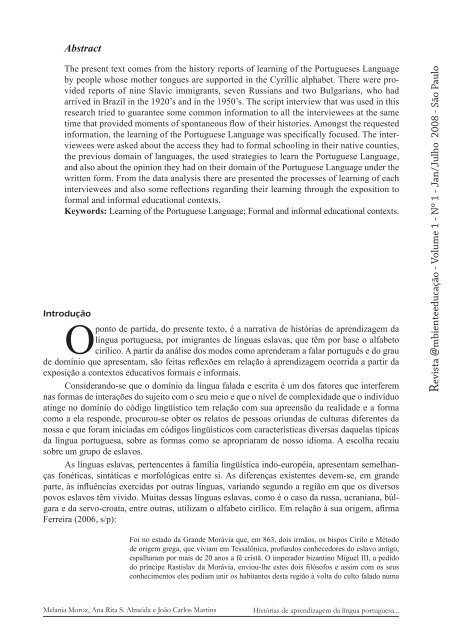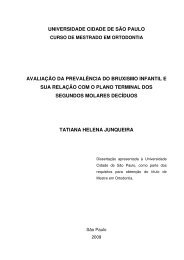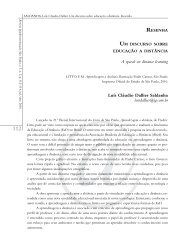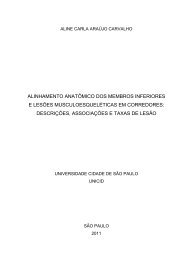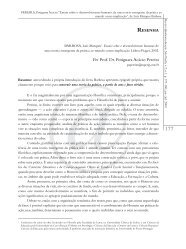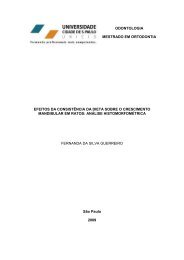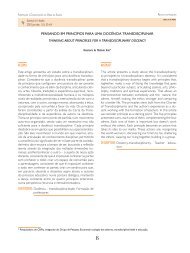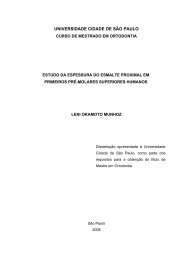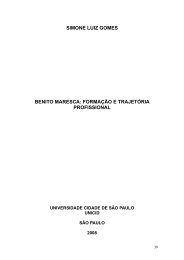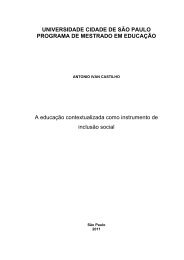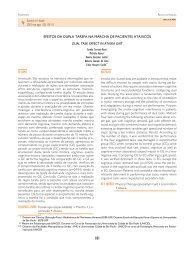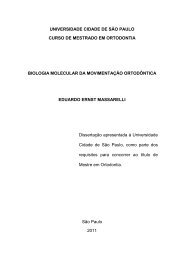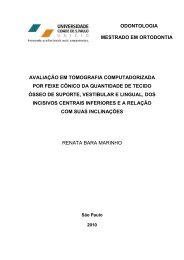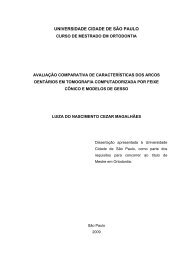reflexões sobre contextos educativos formais e informais. - Unicid
reflexões sobre contextos educativos formais e informais. - Unicid
reflexões sobre contextos educativos formais e informais. - Unicid
Create successful ePaper yourself
Turn your PDF publications into a flip-book with our unique Google optimized e-Paper software.
Abstract<br />
The present text comes from the history reports of learning of the Portugueses Language<br />
by people whose mother tongues are supported in the Cyrillic alphabet. There were provided<br />
reports of nine Slavic immigrants, seven Russians and two Bulgarians, who had<br />
arrived in Brazil in the 9 0’s and in the 950’s. The script interview that was used in this<br />
research tried to guarantee some common information to all the interviewees at the same<br />
time that provided moments of spontaneous flow of their histories. Amongst the requested<br />
information, the learning of the Portuguese Language was specifically focused. The interviewees<br />
were asked about the access they had to formal schooling in their native counties,<br />
the previous domain of languages, the used strategies to learn the Portuguese Language,<br />
and also about the opinion they had on their domain of the Portuguese Language under the<br />
written form. From the data analysis there are presented the processes of learning of each<br />
interviewees and also some reflections regarding their learning through the exposition to<br />
formal and informal educational contexts.<br />
Keywords: Learning of the Portuguese Language; Formal and informal educational contexts.<br />
Introdução<br />
O<br />
ponto de partida, do presente texto, é a narrativa de histórias de aprendizagem da<br />
língua portuguesa, por imigrantes de línguas eslavas, que têm por base o alfabeto<br />
cirílico. A partir da análise dos modos como aprenderam a falar português e do grau<br />
de domínio que apresentam, são feitas <strong>reflexões</strong> em relação à aprendizagem ocorrida a partir da<br />
exposição a <strong>contextos</strong> <strong>educativos</strong> <strong>formais</strong> e in<strong>formais</strong>.<br />
Considerando-se que o domínio da língua falada e escrita é um dos fatores que interferem<br />
nas formas de interações do sujeito com o seu meio e que o nível de complexidade que o indivíduo<br />
atinge no domínio do código lingüístico tem relação com sua apreensão da realidade e a forma<br />
como a ela responde, procurou-se obter os relatos de pessoas oriundas de culturas diferentes da<br />
nossa e que foram iniciadas em códigos lingüísticos com características diversas daquelas típicas<br />
da língua portuguesa, <strong>sobre</strong> as formas como se apropriaram de nosso idioma. A escolha recaiu<br />
<strong>sobre</strong> um grupo de eslavos.<br />
As línguas eslavas, pertencentes à família lingüística indo-européia, apresentam semelhanças<br />
fonéticas, sintáticas e morfológicas entre si. As diferenças existentes devem-se, em grande<br />
parte, às influências exercidas por outras línguas, variando segundo a região em que os diversos<br />
povos eslavos têm vivido. Muitas dessas línguas eslavas, como é o caso da russa, ucraniana, búlgara<br />
e da servo-croata, entre outras, utilizam o alfabeto cirílico. Em relação à sua origem, afirma<br />
Ferreira ( 006, s/p):<br />
Foi no estado da Grande Morávia que, em 863, dois irmãos, os bispos Cirilo e Método<br />
de origem grega, que viviam em Tessalônica, profundos conhecedores do eslavo antigo,<br />
espalharam por mais de 20 anos a fé cristã. O imperador bizantino Miguel III, a pedido<br />
do príncipe Rastislav da Morávia, enviou-lhe estes dois filósofos e assim com os seus<br />
conhecimentos eles podiam unir os habitantes desta região à volta do culto falado numa<br />
Melania Moroz, Ana Rita S. Almeida e João Carlos Martins Histórias de aprendizagem da língua portuguesa...<br />
Revista @mbienteeducação - Volume 1 - Nº 1 - Jan/Julho 2008 - São Paulo


